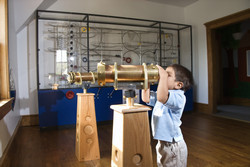Upgrading the role of museums in contemporary Europe
The EU-funded MELA(opens in new window) (European museums in an age of migrations) project adopted the notion of ‘migration’ as a paradigm of the contemporary global and multi-cultural world, characterised by such processes as increased mobility, fluid circulation of information, transnationalisation of labour and the refashioning of cultural and political spheres. Against this backdrop, the project's main objective was to identify innovative practices and tools that may enhance the role of museums in nurturing the entrenchment of an inclusive European identity – one that facilitates mutual understanding, raises awareness and fosters social cohesion. Through the cooperation of nine European partners, MeLa analysed how and at what extent the present political, social, and cultural contexts affect the evolution of museums as cultural spaces, processes and physical places. Researchers explored the redefinition of museums’ mission, strategies and tools, in order to allow them to adequately respond to the challenges as well as the opportunities ensuing from the present scenario, develop innovative interactions with new social groups and audiences, and eventually act as agents of social cohesion and stability in Europe. To address the complexity of its core topics, MeLa organised its activities into six thematic Research Fields, which were developed through a groundbreaking approach based on the intertwining of traditional and experimental research practices and tools. Bibliographical surveys were complemented by on-site analyses and fieldwork in a number of European museums, galleries and archives, as well as by interviews with directors and curators, and in-depth visitor studies. The implementation of cross-disciplinary and practice-based research actions – ranging from curatorial and artistic initiatives to the design of innovative digital tools – contributed to the experimentation with new research tools for social sciences and humanities. Public events, brainstorming sessions and inter-sectorial collaborations facilitated the cooperation and consultation with museum practitioners, artists and policymakers. Extensive access to the outcomes of the MeLa project has been promoted through the development of several dissemination tools. These include the MeLa Book Series(opens in new window) (a comprehensive collection of open-access digital volumes), the MeLa Brochures (seven policy-oriented booklets illustrating key observations and recommendations), and the MeLa Critical Archive(opens in new window) (a multipurpose digital tool providing a critical insight on the main findings of the project). Overall, MeLa has produced a multifocal advancement of knowledge, aimed at supporting the scientific community, museum professionals, policymakers and the European Commission in envisioning the evolution of contemporary museums in this ‘age of migrations’, raising awareness of the strategic role they may play in building an inclusive European identity, and fostering their impact on cultural diversity and social cohesion.



